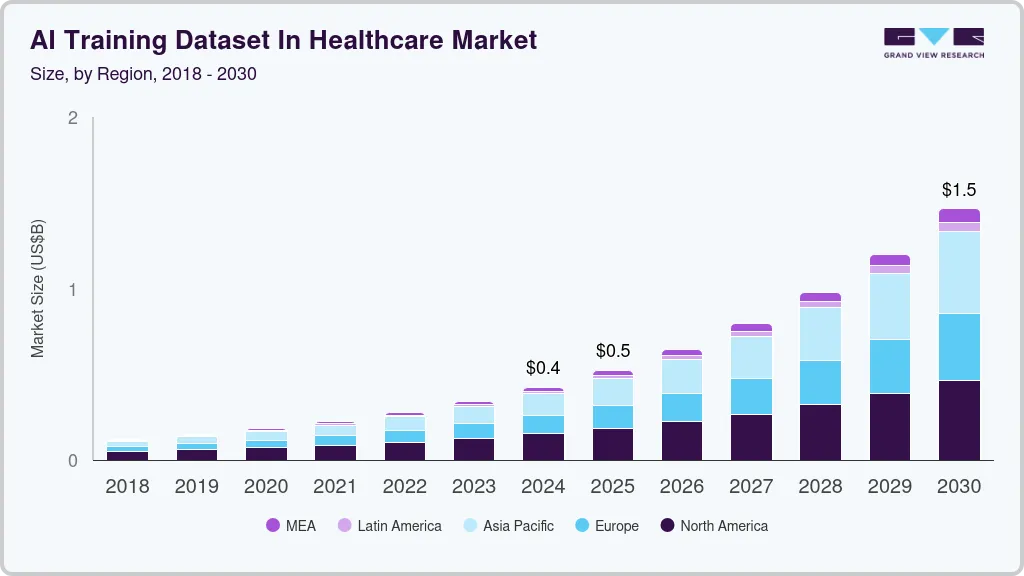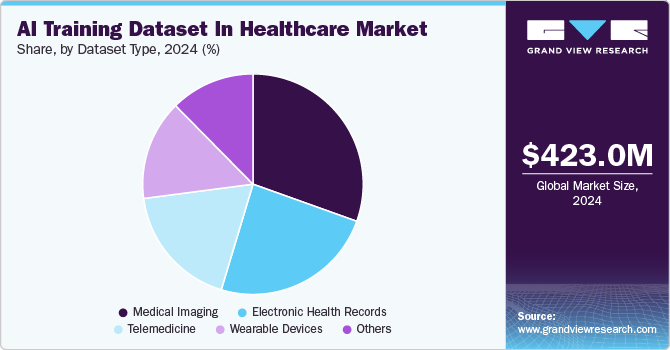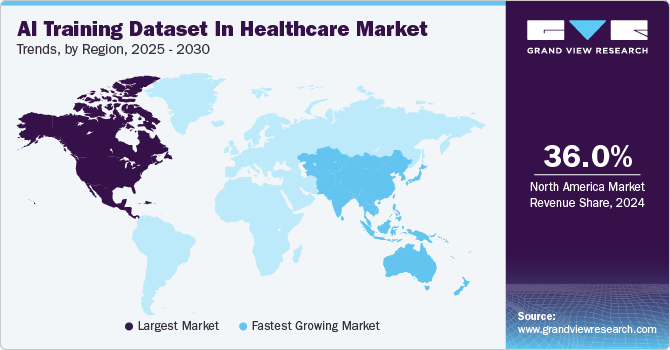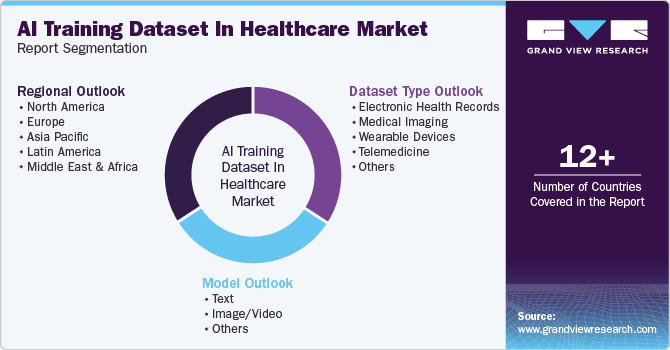- Home
- »
- Next Generation Technologies
- »
-
AI Training Dataset In Healthcare Market Size Report, 2030GVR Report cover
![AI Training Dataset In Healthcare Market Size, Share & Trends Report]()
AI Training Dataset In Healthcare Market (2025 - 2030) Size, Share & Trends Analysis Report By Model (Image/Video, Text), By Dataset Type (Medical Imaging, Telemedicine, Electronic Health Records, Wearable Devices), By Region, And Segment Forecasts
- Report ID: GVR-4-68040-136-4
- Number of Report Pages: 100
- Format: PDF
- Historical Range: 2018 - 2024
- Forecast Period: 2025 - 2030
- Industry: Technology
- Report Summary
- Table of Contents
- Interactive Charts
- Methodology
- Download FREE Sample
-
Download Sample Report
AI Training Dataset In Healthcare Market Summary
The global AI training dataset in healthcare market size was estimated at USD 423.0 million in 2024 and is projected to reach USD 1.47 billion by 2030, growing at a CAGR of 22.9% from 2025 to 2030. The field is expanding rapidly as machine learning and AI technologies gain traction in various healthcare applications.
Key Market Trends & Insights
- North America leads the global AI training dataset in healthcare market, accounting for a leading share of 36.0% in 2024.
- The AI training dataset in healthcare market in the U.S. is experiencing significant growth.
- By model, image/video dominated the market in 2024 with a market share of 43.2%.
- By dataset type, medical imaging has achieved a dominant position in 2024.
Market Size & Forecast
- 2024 Market Size: USD 423.0 Million
- 2030 Projected Market Size: USD 1.47 Billion
- CAGR (2025-2030): 22.9%
- North America: Largest market in 2024
These datasets are essential for training AI models that assist in diagnostics, treatment planning, drug discovery, and personalized medicine. Data typically includes patient records, medical images, genetic data, and clinical notes, enabling AI to identify patterns and provide insights. As the healthcare industry increasingly adopts AI, the need for diverse and high-quality datasets becomes more pronounced. Well-trained AI models can improve decision-making, increase accuracy, and enhance patient outcomes. These datasets allow healthcare professionals to make better-informed decisions, resulting in more effective treatments and streamlined workflows.A significant market driver is the growing volume of healthcare data from electronic health records (EHRs), medical imaging, and wearable devices. These data sources generate vast amounts of information that can be utilized to train AI models. The collaboration between healthcare organizations and technology companies to create large, diverse datasets is crucial for enhancing the accuracy and efficiency of AI systems. With the availability of comprehensive data, AI can support early disease detection, risk prediction, and the optimization of treatment plans. This contributes to better healthcare outcomes and more cost-effective services. Data from multiple sources is harnessed to ensure AI models can recognize patterns in complex and varied patient populations, further improving model performance.

The healthcare industry focuses on improving data interoperability, which assists in developing AI training datasets. Interoperability refers to the ability of different healthcare systems and technologies to communicate and share data seamlessly. With the rise of AI in healthcare, having standardized, interoperable data is essential for training models that can function across diverse healthcare settings. Organizations are increasingly working to harmonize healthcare data formats, systems, and platforms to ensure that AI models can access a broader range of high-quality data from various sources. Improved interoperability enables AI systems to perform more accurately across patient populations and healthcare environments. As the healthcare industry digitizes, interoperability becomes a foundational aspect of creating comprehensive, useful AI training datasets.
Model Insights
Image/video dominated the market in 2024 with a market share of 43.2% due to the increasing demand for AI-powered solutions in medical imaging, diagnostic tools, and treatment planning. AI models trained on high-quality medical images and video data enable healthcare professionals to accurately identify patterns and abnormalities. With the rapid advancements in imaging technologies such as MRI, CT scans, and X-rays, there is a growing need for AI systems to interpret these complex datasets. As healthcare organizations focus on early detection and personalized care, AI's ability to analyze vast volumes of imaging data is critical for improving patient outcomes. This segment continues to lead the market, supported by innovations in computer vision and deep learning techniques.
Text is also gaining traction in the market, particularly in analyzing electronic health records (EHRs), clinical notes, and medical literature. AI models trained on text data can extract valuable insights, identify trends, and assist in clinical decision-making by analyzing large volumes of unstructured data. Text-based AI applications in healthcare include natural language processing (NLP) tools for automated medical transcription, disease classification, and predictive analytics. As the healthcare industry shifts towards more data-driven approaches, the ability to mine and interpret text data from various sources is becoming increasingly important. This segment is expected to grow, especially with advancements in NLP techniques, enhancing the integration of AI in clinical workflows.
Dataset type Insights
Medical Imaging has achieved a dominant position in 2024, driven by the increasing demand for AI-driven diagnostic tools and advancements in imaging technologies. AI models trained on medical images such as X-rays, CT scans, and MRIs enable healthcare professionals to detect diseases such as cancer, cardiovascular conditions, and neurological disorders more precisely. The ability of AI to analyze complex imaging data quickly and accurately transforms healthcare by enhancing early detection and improving treatment outcomes. As healthcare systems continue to adopt AI for medical imaging applications, the demand for large, high-quality image datasets is growing. This segment is expected to maintain its leadership, fueled by innovations in computer vision and deep learning.

Wearable devices is growing rapidly within the market, as the widespread adoption of wearable health devices generates vast amounts of real-time data. These devices, such as fitness trackers and smartwatches, collect vital health metrics such as heart rate, activity levels, and sleep patterns, which can be analyzed using AI for personalized health insights. AI models trained on wearable device data can help monitor chronic conditions, predict health risks, and provide users with actionable recommendations. As consumers and healthcare providers increasingly rely on wearable technology to monitor health and wellness, the demand for AI-powered analysis of this data continues to rise. This segment is poised for significant growth as advancements in sensor technology and data analytics enhance the accuracy and usefulness of health tracking.
Regional Insights
North America leads the global AI training dataset in healthcare market, accounting for a leading share of 36.0% in 2024. North America is a dominant region in the AI training dataset in the healthcare industry, driven by the strong adoption of AI technologies and a robust healthcare infrastructure. The region has a large number of technology companies, healthcare providers, and research institutions that are investing heavily in AI-powered solutions. Government initiatives and favorable regulatory environments further support the development of AI tools in healthcare, including funding for research and the implementation of AI in medical diagnostics and treatment planning.

U.S. AI Training Dataset In Healthcare Market Trends
The AI training dataset in healthcare market in the U.S. is experiencing significant growth, driven by the country's advanced healthcare infrastructure and rapid technological advancements. With major players such as IBM, Microsoft, and Google expanding their AI healthcare portfolios, the U.S. is at the forefront of AI innovation. The availability of vast amounts of healthcare data from hospitals, clinical trials, and patient records supports the development of high-quality AI models.
Europe AI Training Dataset In Healthcare Market Trends
The AI training dataset in the healthcare market in Europe is experiencing significant growth, with a strong emphasis on data privacy regulations such as the GDPR. The region is focused on improving healthcare delivery by leveraging AI to assist with diagnostics, treatment planning, and patient management. European countries are investing in AI research and promoting the integration of AI across healthcare systems, with collaborations between tech companies and healthcare providers.
Asia Pacific AI Training Dataset In Healthcare Market Trends
The AI training dataset in healthcare market in Asia Pacific is witnessing rapid expansion, driven by technological advancements and increasing healthcare needs. The growing healthcare infrastructure, particularly in countries such as China, Japan, and India, is fostering the adoption of AI in medical diagnostics, drug discovery, and personalized care. As the region deals with large and diverse populations, AI models are being trained on varied datasets to address specific healthcare challenges, such as disease outbreaks and aging populations.
Key AI Training Dataset In Healthcare Company Insights
Some of the key companies in the market include Amazon Web Services, Inc., Appen Limited, Cogito Tech LLC, Deep Vision Data, Google, LLC, and others. Organizations focus on increasing customer base to gain a competitive edge in the industry. Therefore, key players are taking several strategic initiatives, such as mergers and acquisitions and partnerships with other major companies.
-
Amazon Web Services, Inc. (AWS) is actively developing AI training datasets for healthcare, offering cloud-based solutions to support creating and training AI models. AWS provides services such as Amazon SageMaker, enabling healthcare organizations to build, train, and deploy machine learning models using large datasets, such as medical imaging and electronic health records. The platform also facilitates partnerships with healthcare providers to create AI tools for diagnostics, personalized medicine, and predictive analytics.
-
Google LLC develops AI training datasets for healthcare through its Google Cloud Platform and AI research initiatives. Google Health collaborates with hospitals and research institutions to develop AI models using diverse datasets such as medical imaging, genomics, and patient records. The company’s AI tools, such as Google Cloud Healthcare API and AutoML, help streamline data management and facilitate the development of advanced AI applications in healthcare.
Key AI Training Dataset In Healthcare Companies:
The following are the leading companies in the AI training dataset in healthcare market. These companies collectively hold the largest market share and dictate industry trends.
- Alegion
- Amazon Web Services, Inc
- Appen Limited
- Cogito Tech LLC
- Deep Vision Data
- Google, LLC (Kaggle)
- Lionbridge Technologies, Inc.
- Microsoft Corporation
- Samasource Inc.
- Scale AI, Inc.
Recent Developments
-
In October 2024, Microsoft introduced innovations in Microsoft Cloud for Healthcare, including healthcare data solutions in Microsoft Fabric, AI models in Azure AI Studio, and an AI-driven nursing workflow solution to enhance patient care, team collaboration, and operational efficiency. These advancements address healthcare challenges, improve data integration, and empower healthcare professionals with AI-powered tools.
-
In September 2024, SCALE AI announced a $21 million investment in nine artificial intelligence (AI) projects to enhance healthcare across Canada. These projects will focus on optimizing resource management, patient care, and wait times. This initiative, part of the Pan-Canadian Artificial Intelligence Strategy, promotes collaboration between hospitals and AI solution providers to drive innovation and ensure ethical data handling in the Canadian healthcare system.
-
In August 2024, Lionbridge Technologies, Inc. launched Aurora AI Studio, a platform designed to help companies train data sets for advanced AI solutions. This addresses the increasing demand for high-quality training data. Lionbridge aims to utilize its data curation and annotation expertise to empower AI developers and enhance commercial outcomes.
AI Training Dataset In Healthcare Market Report Scope
Report Attribute
Details
Market size in 2025
USD 523.0 million
Revenue forecast in 2030
USD 1.47 billion
Growth rate
CAGR of 22.9% from 2025 to 2030
Actual data
2018 - 2024
Forecast period
2025 - 2030
Quantitative units
Revenue in USD million/billion and CAGR from 2025 to 2030
Report coverage
Revenue forecast, company ranking, competitive landscape, growth factors, and trends
Segment scope
Model, dataset type, region
Region scope
North America; Europe; Asia Pacific; Latin America; Middle East & Africa
Country scope
U.S.; Canada; Mexico; Germany; UK; France; China; Japan; India; Australia; South Korea; Brazil; KSA; USE; South Africa
Key companies profiled
Alegion; Amazon Web Services, Inc.; Appen Limited; Cogito Tech LLC; Deep Vision Data; Google, LLC (Kaggle); Lionbridge Technologies, Inc.; Microsoft Corporation; Samasource Inc.; Scale AI, Inc.
Customization scope
Free report customization (equivalent up to 8 analysts’ working days) with purchase. Addition or alteration to country, regional & segment scope
Pricing and purchase options
Avail customized purchase options to meet your exact research needs. Explore purchase options
Global AI Training Dataset In Healthcare Market Report Segmentation
This report offers revenue growth forecasts at the global, regional, and country levels and provides an analysis of the latest industry trends in each of the sub-segments from 2018 to 2030. For this study, Grand View Research has segmented the global AI training dataset in healthcare market report based on model, dataset type, and region:

-
Model Outlook (Revenue, USD Million, 2018 - 2030)
-
Text
-
Image/Video
-
Others
-
-
Dataset Type (Revenue, USD Million, 2018 - 2030)
-
Electronic Health Records
-
Medical Imaging
-
Wearable Devices
-
Telemedicine
-
Others
-
-
Regional Outlook (Revenue, USD Million, 2018 - 2030)
-
North America
-
U.S.
-
Canada
-
Mexico
-
-
Europe
-
UK
-
Germany
-
France
-
-
Asia Pacific
-
China
-
Japan
-
India
-
Australia
-
South Korea
-
-
Latin America
-
Brazil
-
-
Middle East & Africa (MEA)
-
KSA
-
UAE
-
South Africa
-
-
Frequently Asked Questions About This Report
b. The global AI training dataset in healthcare market size was estimated at USD 423.0 million in 2024 and is expected to reach USD 523.0 million in 2025.
b. The global AI training dataset in healthcare market is expected to grow at a compound annual growth rate of 22.9% from 2025 to 2030 to reach USD 1.47 billion by 2030.
b. North America dominated the AI training dataset in healthcare market with a share of 36.0% in 2024. Due to the increasing demand for personalized healthcare solutions, the AI training dataset in the North American market is trending toward enhancing patient outcomes through advanced predictive analytics.
b. Some key players operating in the AI training dataset in healthcare market include Alegion, Amazon Web Services, Inc., Appen Limited, Cogito Tech LLC, Deep Vision Data, Google, LLC (Kaggle), Lionbridge Technologies, Inc., Microsoft Corporation, Samasource Inc., Scale AI, Inc.
b. Key factors that are driving the market growth include electronic health records and patient data, which are advancing AI applications in healthcare. Advances in medical imaging and personalized medicine are propelling the growth of AI training dataset usage in healthcare.
Share this report with your colleague or friend.
Need a Tailored Report?
Customize this report to your needs — add regions, segments, or data points, with 20% free customization.

ISO 9001:2015 & 27001:2022 Certified
We are GDPR and CCPA compliant! Your transaction & personal information is safe and secure. For more details, please read our privacy policy.
Trusted market insights - try a free sample
See how our reports are structured and why industry leaders rely on Grand View Research. Get a free sample or ask us to tailor this report to your needs.










